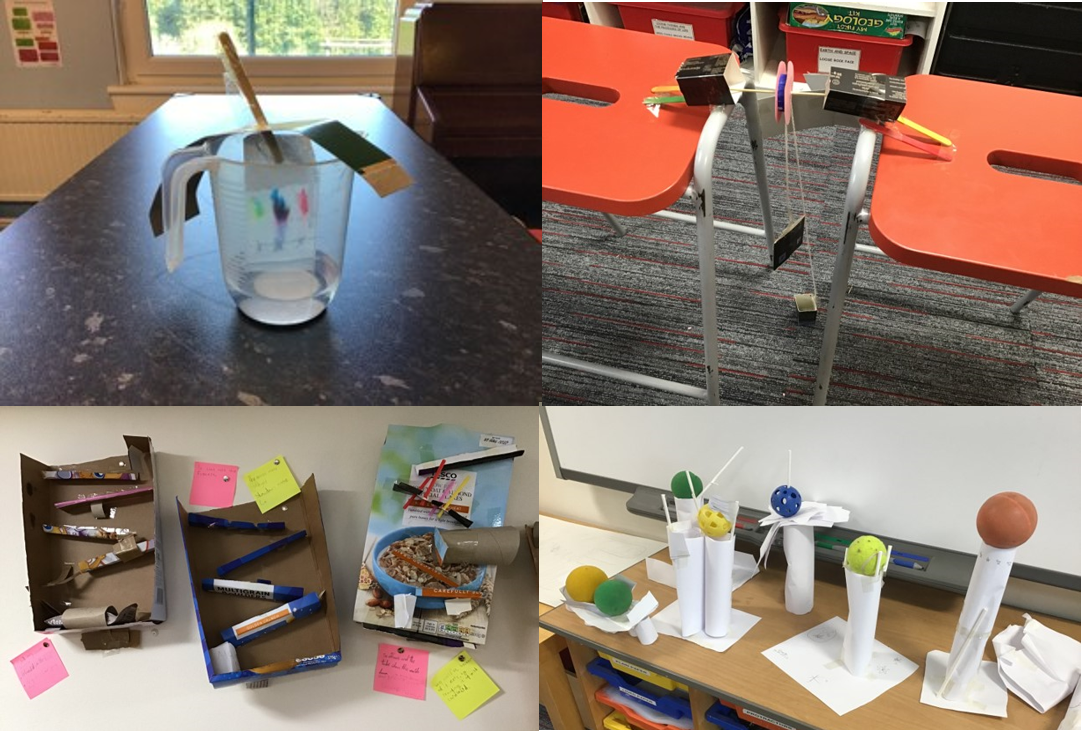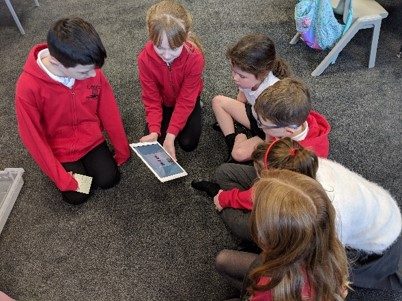We would love to showcase your practice showing STEM education in a primary context. If you have something to share then please email the STEM team at STEM@educationscotland.gov.scot
Creativity in STEM at Ratho Primary School
The Young STEM Leaders at Ratho Primary School gave a presentation at the National Creative Learning Network Event at Dynamic Earth in Edinburgh. Olivia and Morven, who are both in P6, showcased the development of creativity skills through Engineering STEM Challenges (solving problems by designing, creating, testing and improving with feedback). They talked about using imagination to come up with innovative designs, curiosity to explore and investigate different options, open-mindedness to negotiate and compromise with team members, problem-solving during building and critical thinking to improve their designs. Morven and Olivia then ran a STEM Challenge for the audience so they could experience this for themselves and reflect on the development of key skills. Amy Dixon, Science Specialist STEM Teacher at Ratho Primary School and STEM Development Officer for the City of Edinburgh Council, spoke about the importance of creating a culture of learning from each other, where risk-taking and making mistakes is a natural part of the learning process. STEM Challenges provide rich opportunities for creative learning and skills development. To find out more about Ratho Primary’s approach to creativtity in STEM please refer to the Power Point presentation Creativity in STEM at Ratho Primary School – Amy Dixon or watch Amy presenting on their approach in this short video.
Muckhart Primary School
In the spirit of empowerment, and having built up excellent relationships with parents and carers over a number of years, the school met with a focus group of parents and grandparents who were willing to give their time to become involved in the development of the STEM curriculum.
They created a plan complete with goals and targets and understood the importance of the plan having impact on our children’s knowledge and understanding of STEM. They also researched and arranged a Forensic Workshop for all children.
This parent/carer team come in to school approx. once a month and deliver a STEM lesson differentiated to suit the two classes. The lesson builds on evaluations from the pupils from the prior lesson.
Without the support of their parents and grandparents they would not be able to fulfil this curriculum experience in such an enjoyable, worthwhile way. The learning is active, practical and engaging and the focus group are keen to deliver these lessons in alignment with the ethos and culture of our school. These lessons support our school; adding variety to the learning. The lessons are challenging but also enjoyable and children are beginning to be able to talk confidently about skills that are being developed in these lessons.
Moorfoot Primary
Moorfoot Primary in Inverclyde have a range of STEM learning opportunities, including digital, for their learners. They have:
- a student-led family Micro:bit club for parents and grandparents
- a STEM club planned and delivered by pupils to the P4 class
- organised a ‘Science Fayre’ with Moorfoot “Numeracy Ambassadors”
- represented the Micro:bit company which culminated in a short video showcasing how the school took forward the use of Micro:bits and coding.
- increased the impact of Micro:bit use through engagement with deaf learners who indicated it had encouraged friendships and teamwork
- involvement in two projects: engineering and mobile coding with Micro:bits. These have promoted sharing of digital resources with local authority schools and raised pupils’ awareness of their capabilities.
Embedding IGBE- Peer teaching


A primary school interested in involving all of their students ran an activity about gendered toy marketing, using toy advertising materials, with their pupil council. The council had representatives from every class in the school.
Once they had completed the activity, the pupil council members agreed to plan and deliver the same activity themselves to their own classes. The younger children were paired with an older child for support. The council members successfully led the lessons with their peers. In this way, every child and teacher across the school was engaged in a meaningful conversation about gender stereotypes, especially within advertising. The initial activity grew and each class produced a poster about gender awareness. The posters were displayed around the school and provoked further conversations. Furthermore, teachers reported an increase in children challenging traditional gender stereotypes in the playground and in classroom activities.





